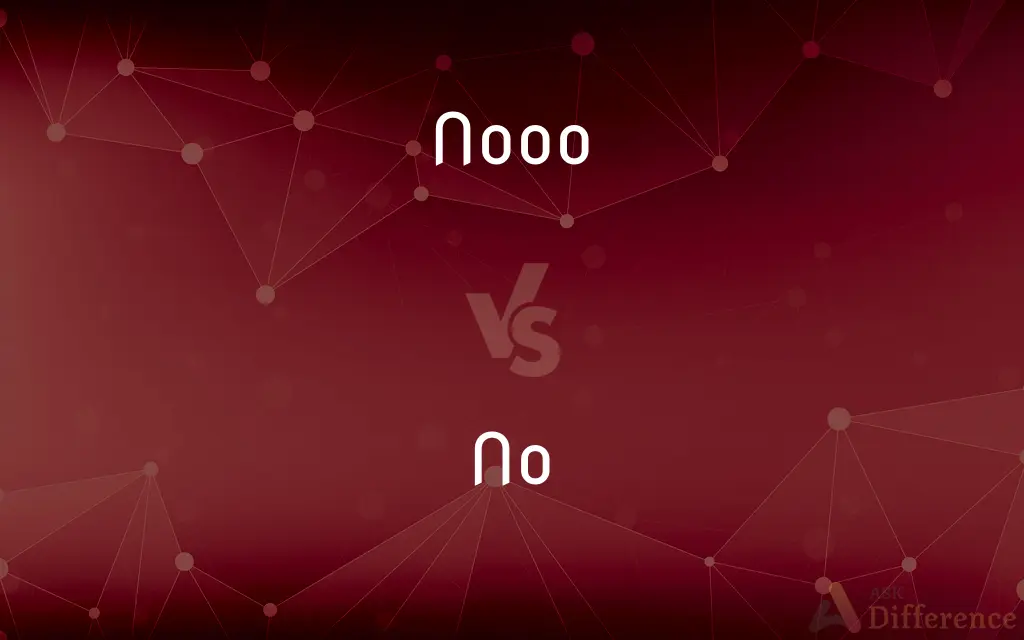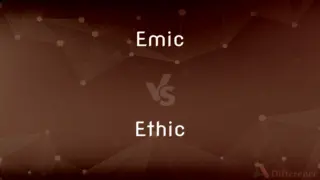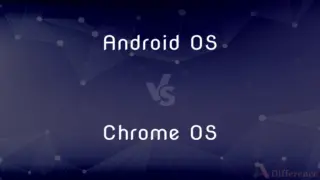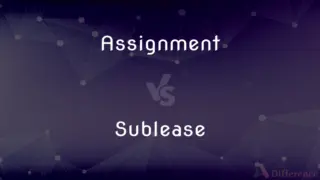Nooo vs. No — What's the Difference?
By Maham Liaqat & Fiza Rafique — Updated on April 7, 2024
"Nooo" is an exaggerated form of "no," often indicating strong emotion or emphasis, while "no" is a standard negative response or denial.

Difference Between Nooo and No
Table of Contents
ADVERTISEMENT
Key Differences
"No" is a fundamental part of language, used universally to negate a statement, refuse an offer, or express disagreement. Its simplicity and clarity make it a cornerstone of communication across contexts. "Nooo," on the other hand, is a more expressive variant, stretching out the vowel sound to convey a range of emotions, from despair and disappointment to emphatic refusal. This elongation modifies the intensity and emotional undertone of the refusal.
In written communication, "no" is straightforward and unambiguous, often appearing in formal and informal contexts alike. It serves as a clear, concise response. Whereas "nooo" is typically found in more casual, informal exchanges, especially in digital communication like texts or social media, where tone and body language are absent. Its usage suggests a more vivid, sometimes playful, conveyance of emotion or emphasis.
The use of "nooo" can indicate a stronger resistance or a more profound sense of regret than a simple "no." It's as if the speaker or writer is taking a moment to draw out their response, adding weight to their denial or refusal. In contrast, "no" is neutral, used in everyday decisions without necessarily carrying an emotional charge.
Punctuation often accompanies "nooo" to further express emotion, such as exclamation marks or ellipses, enhancing its dramatic or humorous effect. On the contrary, "no" can stand alone, universally understood without the need for additional punctuation to convey its meaning.
In the realm of literature and drama, "nooo" can be a tool for character development or setting a scene, suggesting a character's desperation or significant emotional turmoil. "No," while equally powerful in the right context, is more often used to advance plots or dialogue in a straightforward manner without the same level of emotional exposition.
ADVERTISEMENT
Comparison Chart
Usage
Exaggerated refusal or emotional negation.
Standard negation or refusal.
Communication Type
Primarily informal.
Both formal and informal.
Emotion
Indicates stronger emotion or emphasis.
Neutral.
Context
Used in casual or digital communication.
Universal across contexts.
Punctuation
Often paired with exclamation marks or ellipses.
Can stand alone.
Compare with Definitions
Nooo
Used for dramatic effect.
Nooo! That can't be true!
No
Used to refuse permission.
No, you may not go out tonight.
Nooo
Expresses despair or disappointment.
Nooo! Not again!
No
Expresses disagreement.
No, I think you're mistaken.
Nooo
Emphasizes a strong refusal or denial.
Nooo! I won't let you do that!
No
A negative response or denial.
No, I cannot attend the meeting tomorrow.
Nooo
Shows emphatic disagreement.
Nooo, that’s not how it happened!
No
Denotes absence or lack.
There are no apples left in the basket.
Nooo
Indicates a prolonged negation.
Nooo, I can’t believe we lost!
No
Indicates a negative vote.
The senator voted no on the proposal.
Nooo
Elongated form of no
No
Not any
There is no excuse
No two plants are alike
No
Used to give a negative response
‘Is anything wrong?’ ‘No.’
No
Not at all; to no extent
They were no more able to perform the task than I was
No
Not
I'll no be a minute
No
Variant spelling of Noh
No
Variant of Noh.
No
A negative response; a denial or refusal
The proposal produced only noes.
No
A negative vote or voter.
No
Used to express refusal, denial, disbelief, emphasis, or disagreement
No, I'm not going. No, you're wrong.
No
Not at all; not by any degree. Often used with the comparative
No better.
No more.
No
Not
Whether or no.
No
(Informal) Used to indicate agreement with a preceding statement, especially when followed by a stronger judgment supporting that statement
"The car is getting old." "No, I know. It must be 10 years old by now.".
No
Used to express strong refusal, doubt, or disbelief.
No
Not any; not one; not a
No cookies are left.
No
Not at all; not close to being
He is no child.
No
Hardly any
Got there in no time flat. See Usage Note at nor1.
No
Not any.
No one
There is no water left.
No hot dogs were sold yesterday.
No phones were at the store.
No two people are the same..
There was no score at the end of the first period. (The score was 0-0.)
No
Hardly any.
We'll be finished in no time at all.
Fifty pounds for this is no money, really.
No
Not any possibility or allowance of (doing something).
No smoking
There's no stopping her once she gets going.
No
Not (a); not properly, not really; not fully.
My mother's no fool.
Working nine to five every day is no life.
No
(with following adjective) not, not at all
No
More and less, and idiomatically before other comparatives.}}
It is a less physical kind of torture, but no less gruesome.
You’re no better than a common thief.
Look no further than one's nose
This is no different from what we've been doing all along.
No
(informal) Used idiomatically before certain other adjectives.
This thing is no good.
The teacher’s decision was no fair.
No
Not
I just want to find out whether she's coming or no.
No
(archaic) nodot=a
No
Without
No
Like
No
Not, does not, do not, etc.
No
A negating expression; an answer that shows disagreement, denial, refusal, or disapproval
No
A vote not in favor, or opposing a proposition
The workers voted on whether to strike, and there were thirty "yeses" and two "nos".
No
Not any; not one; none; as, yes, we have no bananas; - often used as a quantifier.
Let there be no strife . . . between me and thee.
That goodness is no name, and happiness no dream.
No
Nay; not; not at all; not in any respect or degree; - a word expressing negation, denial, or refusal. Before or after another negative, no is emphatic.
We do no otherwise than we are willed.
I am perplx'd and doubtful whether or noI dare accept this your congratulation.
There is none righteous, no, not one.
No! Nay, Heaven forbid.
No
A refusal by use of the word no; a denial.
No
A negative vote; one who votes in the negative; as, to call for the ayes and noes; the noes have it.
No
A negative;
His no was loud and clear
No
A radioactive transuranic element synthesized by bombarding curium with carbon ions; 7 isotopes are known
No
Quantifier; used with either mass nouns or plural count nouns for indicating a complete or almost complete lack or zero quantity of;
We have no bananas
No eggs left and no money to buy any
Have you no decency?
Did it with no help
I'll get you there in no time
Have some milk
Some roses were still blooming
Having some friends over
Some apples
Some paper
No
Referring to the degree to which a certain quality is present;
He was no heavier than a child
No
Not in any degree or manner; not at all;
He is no better today
No
Used to express refusal or denial or disagreement etc or especially to emphasize a negative statement;
No, you are wrong
Common Curiosities
What does the elongation in "nooo" signify?
The elongation in "nooo" signifies a stronger emotional response, adding emphasis or drama to the negation.
Does "nooo" always indicate negativity?
While "nooo" is a negation, it can also express a wide range of emotions, including surprise, sadness, or even humor.
Is "nooo" acceptable in formal writing?
"No" is preferred in formal writing, while "nooo" is better suited for informal or creative contexts.
Can "nooo" change the tone of a conversation?
Yes, "nooo" can change the tone by introducing a stronger emotional element or a sense of urgency or emphasis.
How do I choose between "no" and "nooo"?
The choice depends on the context and desired tone: "no" for straightforward refusals, "nooo" for emphasis or emotional expressiveness.
Can the number of 'o's in "nooo" vary?
Yes, adding more 'o's (e.g., "noooo") can further emphasize the emotion or dramatic effect.
Does "nooo" have different meanings in different cultures?
While the emotional emphasis might be universally understood, cultural nuances can affect its perception and appropriateness.
Is it appropriate to use "nooo" in serious situations?
In serious situations, the use of "nooo" should be carefully considered as it might be seen as overly dramatic or inappropriate.
How is "nooo" perceived in text messages?
In text messages, "nooo" is often perceived as playful, emphatic, or conveying disappointment, depending on context.
Can "nooo" be used in professional emails?
It's generally not suitable for professional emails due to its informal and emotive nature.
Share Your Discovery

Previous Comparison
Inscrutable vs. Unintelligible
Next Comparison
Emic vs. EthicAuthor Spotlight
Written by
Maham LiaqatCo-written by
Fiza RafiqueFiza Rafique is a skilled content writer at AskDifference.com, where she meticulously refines and enhances written pieces. Drawing from her vast editorial expertise, Fiza ensures clarity, accuracy, and precision in every article. Passionate about language, she continually seeks to elevate the quality of content for readers worldwide.















































